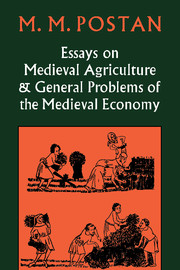Book contents
- Frontmatter
- Preface
- Acknowledgements
- Contents
- I GENERAL
- 1 The economical foundations of medieval economy
- 2 The rise of a money economy
- 3 The fifteenth century
- 4 Some social consequences of the Hundred Years War
- 5 The costs of the Hundred Years War
- 6 Why was science backward in the Middle Ages?
- II AGRARIAN
- Index
- Plate section
5 - The costs of the Hundred Years War
Published online by Cambridge University Press: 05 November 2011
- Frontmatter
- Preface
- Acknowledgements
- Contents
- I GENERAL
- 1 The economical foundations of medieval economy
- 2 The rise of a money economy
- 3 The fifteenth century
- 4 Some social consequences of the Hundred Years War
- 5 The costs of the Hundred Years War
- 6 Why was science backward in the Middle Ages?
- II AGRARIAN
- Index
- Plate section
Summary
Nowadays most of us take it for granted that nations do not profit from wars; not even from victorious wars. Recently, however, we have been told that this assumption does not apply to the Hundred Years War. The argument, if I understand it correctly, is that whereas France suffered war damage of every kind, England and Englishmen on balance profited from the military campaigns and from the occupation of French territory. I propose to inspect this balance somewhat more closely than has so far been done.
There are two ways of counting the costs and profits of war. One, the economic, is to reckon in real terms, i.e. in material resources and economic activities diverted to war or enlarged by it. The other, the financial or the bullionist one, is to confine the count to the disbursements and receipts of treasure. These two ways of reckoning overlap at certain points, but on the whole they deal with different sets of counters and must be considered separately.
The balance of the account in real terms is very simple and I am going to begin by declaring it. In real terms England's net balance of loss and gain in the Hundred Years War was bound to be in the red. The most obvious real cost was that of manpower diverted to war-making and in the first place that of soldiers in the field and in garrisons.
- Type
- Chapter
- Information
- Publisher: Cambridge University PressPrint publication year: 1973



